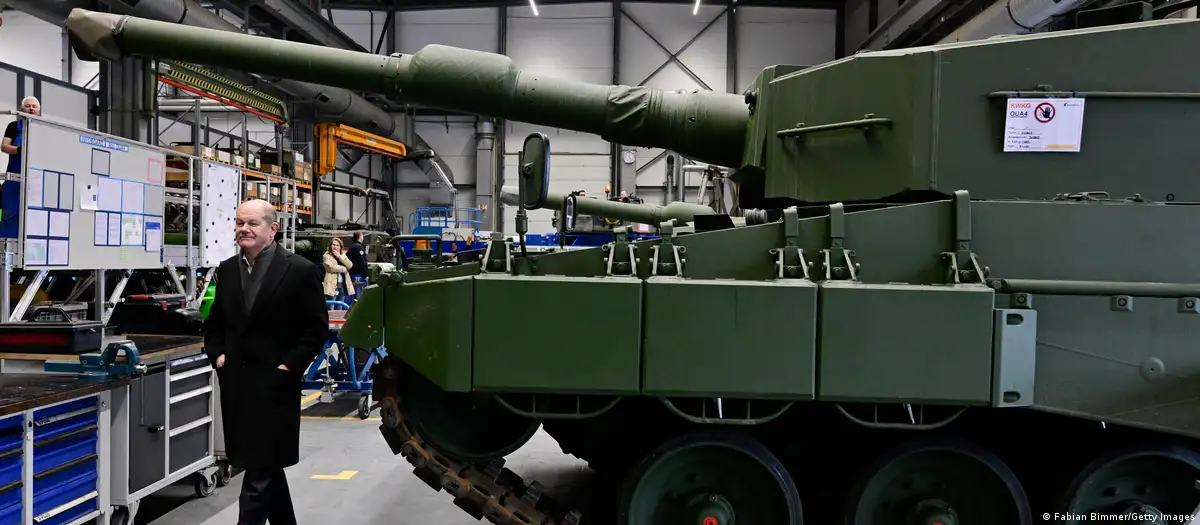The German Chancellor spoke at the site of the future Rheinmetall munitions factory. The policy of “peace through deterrence” is also endorsed by Macron, who sees a chance for the EU arms industry.
(DW) Taking part on Monday (12/02) in an event marking the start of construction of a Rheinmetall ammunition factory, German Federal Chancellor Olaf Scholz defended the massive and urgent increase in arms production in Europe on the grounds that Europe is “not living in times of peace”.
Explicitly alluding to Russia’s two-year invasion of Ukraine, Scholz said that Moscow’s “imperial ambitions” are a “great danger” to peace on the continent, and suggested that arming oneself could be an effective means of discouraging attacks.
“Anyone who wants peace has to scare off potential aggressors,” said the Social Democrat at the construction site, alongside Defense Minister Boris Pistorius and Danish Prime Minister Mette Frederiksen. “We must move from manufacturing to mass production of armaments.”
Echoing Scholz’s words, Frederiksen later wrote on X (formerly Twitter) that it is necessary to “strengthen our defense industry to continue supporting Ukraine and provide a strong deterrent and European defense against the threat from Russia.”
Plant to be ready in 2025
Rheinmetall’s plant in Unterlüß, in the state of Lower Saxony, is due to be completed in 2025 and produce 200,000 rounds of ammunition a year for different types of weaponry, including German-made shells delivered to Kiev, explosives and artillery pieces for rockets.
“At the front in eastern Ukraine, thousands of rounds of ammunition are currently being fired – per day, it should be noted. This shows how important it is to continuously produce these munitions ourselves,” said Scholz.
Scholz’s statements come at a time of stagnation in the Ukrainian counter-offensive and uncertainty about the solidity of American support for its partners in the West.
The United States is Ukraine’s largest military funder, but the aid has been questioned domestically, with Republicans blocking the transfer of dollars in Congress in a White House election year.
Last Saturday (10/02), former US president and pre-candidate Donald Trump suggested that, if he returns to office, the US could leave North Atlantic Treaty Organization (NATO) allies at Russia’s mercy in the event of a possible attack.
Billion-dollar contracts
Armin Papperger, chairman of Rheinmetall’s board of directors, praised the German government in an interview with the Tagesspiegel newspaper, saying that last year public contracts accounted for 10 billion euros (R$53 billion) in revenue for the company, a figure that should rise to around 15 billion euros (R$80 billion) by 2024 – which represents approximately 20% of Rheinmetall’s turnover.
According to Papperger, the aim is to help guarantee Germany’s “strategic sovereignty in the field of large-caliber ammunition”, at a time when NATO is calling for an increase in arms production in Europe.
“We have to restore and expand our industrial base more quickly in order to be able to increase supplies to Ukraine and replenish our own stocks,” said NATO Secretary General Jens Stoltenberg in an interview with the Welt am Sonntag newspaper published on Saturday. “This means moving from slow production in times of peace to accelerated production in times of conflict.”
A similar tone was adopted by French President Emmanuel Macron, who in a meeting with Polish Prime Minister Donald Tusk called for more European cooperation in the area of defense. According to Macron, everything the European Union does to help Ukraine militarily should also serve to rebuild the bloc’s war industry. “This helps us increase our productive capacity and make Europe a defense power that complements NATO.”
ra (AFP, EFE, Reuters, ots) *** Translated by DEFCONPress FYI Team ***
